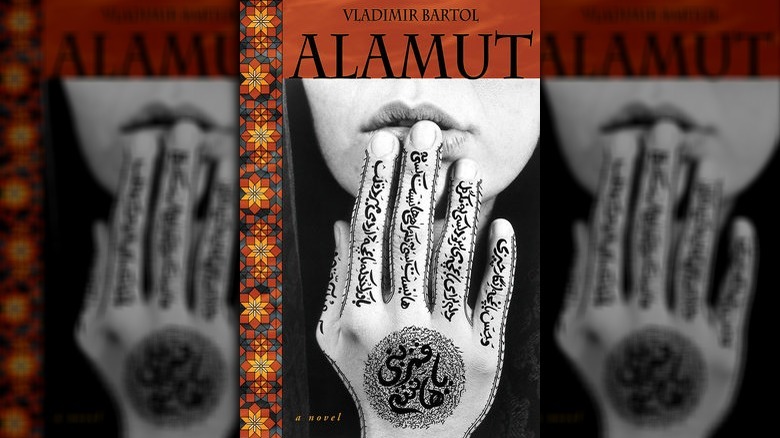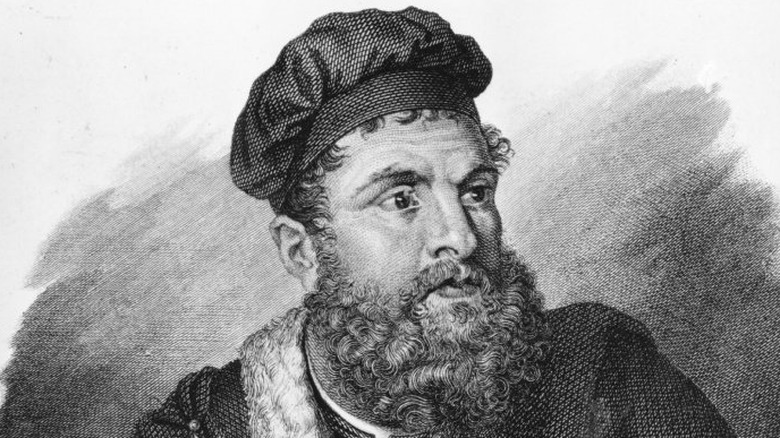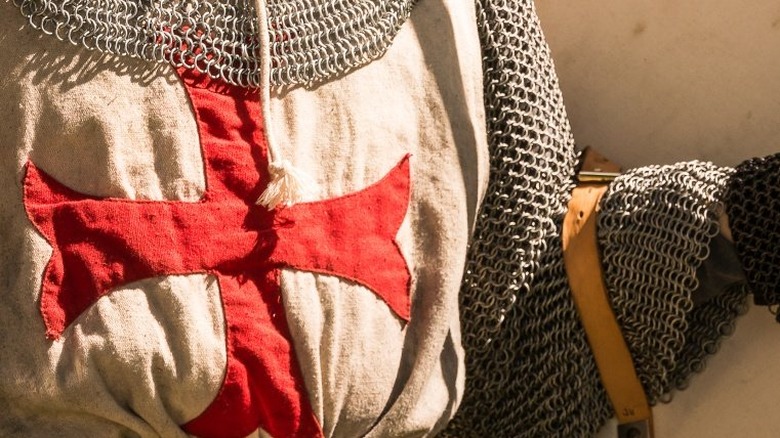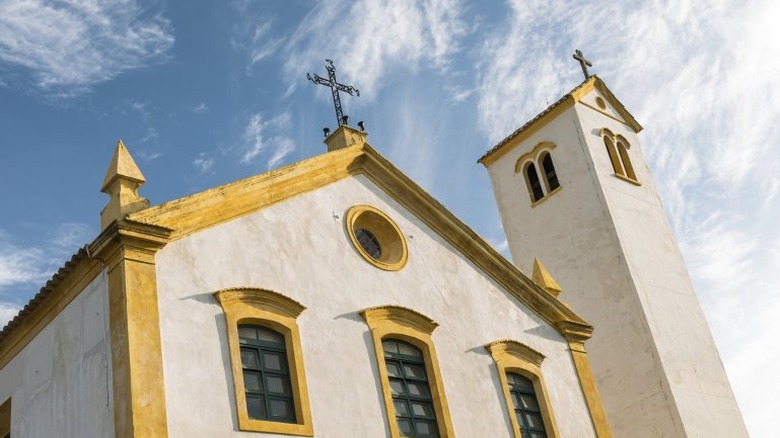The Untold Truth Of The Real Assassin's Creed
Assassin's Creed is based on a long-running video game series, that — like the movie — follows the exploits of Templars and Assassins through time as they fight over weird alien science MacGuffins. Aside from the alien stuff, the games attempt to stick rather closely to real history, telling the story of the world, with some quick inserts of the Assassin and Templar's feud.
But how much of that is true? There really were assassins and Templars, weren't there? Don't tell us The Last Crusade lied to us! So what exactly did this movie, and these games, get right? What is the untold truth of the REAL Assassin's Creed?
Alamut: or, the inspiration for the Assassins
The creators of Assassin's Creed, well ... let's just say (since we don't want to face the wrath of Ubisoft's lawyers) that some elements of the series may have been borrowed from a book. In fact, the creators seemed to have borrowed so much, you could just say that the creators adapted a book. Probably. Please don't sue.
That book is Alamut which, if you ask us, is a much better title than Assassin's Creed. Now, we don't want to get too bogged down in specifics about the similarities, so let's just say Alamut is a book featuring the Assassins, in their fortress, starring their leader — in short, the exact elements featured in the first Assassin's Creed. Basically, that game is just your character going back and living through the events of the novel (plus weird alien stuff). Hell, even the main screed of the Assassin's, "Nothing is true, everything is permitted"? Guess where they derived that from! You get three guesses and sod it, it's Alamut.
The Original Assassins
All right, now that we've got that out of the way, let's get to the real history of the Nizari Ismailis. Who? Oh, that's the real name of the Assassins. The Nizari Ismalis were an Islamic sect living in various places starting in the 1000s. Not all of the Ismalis were assassins, but the entire sect was branded as such, due to the actions of a few, like how the whole class got detention because one kid threw spitballs, only more death-y.
Unlike the Assassins in the games, these assassins would spend years gaining the trust of their targets. In fact, you could more accurately call them spies — since almost no one could tell who was one, and they literally would infiltrate dozens of places with no one having any idea. But what really earned them their reputation, though, was doing their killing out in the open. The idea was, "mess with us and this is what happens," and since the group totally managed to become literally synonymous with the idea of killing ... point made.
Although, a point should also be made that the group wasn't interested in random chaos — all the people they assassinated were high-ranking officials attacking them. So, no, they didn't just start randomly stabbing people in the middle of the street (like every single Assassin's Creed player has done) — they only stabbed people who deserved it. Like politicians.
The Old Man of the Mountain
Now, the Assassins didn't spring up fully formed, and they weren't a hive mind. Instead, like most human organizations, there was a central leader nicknamed the Old Man of the Mountain. For you Assassin's Creed gamers, he's the one you kill at the end of the first game because, uh, reasons. (The first game is very not good.)
Now, he wasn't the one who started focusing the group on assassinating people, but he's the guy who made it into what it was. Think of him as the Abraham Lincoln of the assassins — he's not the first, but pretty much the defining one. (The George Washington was an awesome dude named Hassan-il Sabab, who founded Alamut. Hmmm, sounds familiar.) The Abe Lincoln/Old Man was Rashid ad-Din Sinan Hasan-ii, who turned the group into what we know them as now, and even attempted to assassinate Saladin. His version of the assassins was so feared, it eventually led to their downfall. How so? Because the group was so powerful, any smart invader knew that the assassins needed to be taken out first.
Marco Polo's writings are why they're so well-known
You know the thing that takes an awesome group of murderers and turns them into a force worthy of video games, books, movies and the friggin' term "assassins"? Much like Batman, it's myth. While the assassins were amazing on their own, their reputation was added to because of all the myths surrounding them.
There was no shortage of people who were willing to spread fear about them, including the Crusaders and, most notably, Marco Polo. See, Polo went to a lot of places and wrote about them, including where the assassins operated. But when he wrote about them, he just straight-up lied, including the "fact" he spread that their name derived from them using hashish. A bunch of others (not all of whom were giggling stoners, shockingly) spread this lie as well — some unknowingly — saying weed is what made the assassins so driven and effective. Not true — about the only thing weed and the Assassins have to do with one another is that the former makes the latter's video game plot way easier to understand.
The real-life Templars
For those of you who don't know who the Templars are, they were basically like knights, except more Jesus-y. The group formed during the Crusades, as a militia of sorts, in reaction to the conflict over who really should own the Holy Land, with Christians and Muslims warring over it. Despite "Jesus Knights" seeming like a super-badass idea (and being an awesome band name), it wasn't until after the Christians had "reclaimed" Jerusalem that the Knights Templar formed, in effort to protect the pilgrims visiting the most sacred land on Earth. So, basically, the Templars were security guards for guests visiting the holy version of DisneyLand. Sounds cool to us!
Everyone thought so, too, for awhile. It was during their protection job that the group first came into conflict with the Muslim assassins, since the whole Crusades were about which group should get the Holy Land. But despite the Assassin's Creed series building them up as fierce rivals, neither of them really ended the other one. The Templars didn't start dying out until...
The beginning of the end of the Templars
It sounds a trifle anticlimactic, but the Templars started drifting apart because, well, that's kinda what happens after time. The post-Crusades Knights were pretty much like your high school friends after graduation: you promise to stick together, meet up sometimes, but life just kinda happens.
See, part of the problem is that their entire thing was protecting the Holy Land, and the Christian pilgrims who were journeying there. But you know what the Holy Land is really terrible at? Not being invaded and taken over all over again — after awhile, the Holy Land wasn't under Christian control anymore, and the Templars had to move.
However, by this point, the Templars had become so normal, everyone took them for granted. Instead of being super-cool holy security guards, they became sort of a de facto Christian police. Their power waned, and their purpose got muddled. Despite that, though, the Templars still had a ton of money; which lead to their final downfall.
The Catholic Church strikes back
There once was a certain King — Phillip the IV — who decided that he wanted the money of the Templars. But he couldn't just take it and go *nyeh*. He had to get it legally, claiming it by right only after taking down the Templars. But how? The Templars were literally Knights of Christ, what could he do? Torture them? Oh ... that ... that works.
Yep, King Phillip tortured the Knights into confessing to crimes they never committed, and used the suspicion everyone had towards them — why were they so secretive? — to paint the Templars as a dark and secret sect. With everyone believing the Templars were some horrifying force, on Friday the Thirteenth, 1307, the King put down an edict against the Templars. He then pulled a real- life Order 66, killing almost all of them, taking their lands and money for himself.
After torture-generating some more heinous confessions, the King took them to the Pope, who had no choice but to dissolve the Knights, at which point the evil King won. But worry not, for the Templars lived on!
Okay, not really, but some people like to pretend. People like ...
The Templars remain?
Now, in the games, both the Assassins and Templars managed to live on to nowadays. The Assassins are now small, cult-ish groups that hide and kill — basically, the exact same as they were in the past. However, the Templars have become a huge corporation that creates weird memory technology that allows you to experience your ancestors' lives and gain their skills because video games are, if nothing else, super weird.
Now, the real Templars haven't survived, and neither have the real Assassins (or did they? Nah, probs not). However, there are still some groups who claim ties to the Knights Templar, for basically the same reason that kid in high school told people he was related to Houdini: because people are really gullible, and being related to famous people is sick.
One of the biggest groups that "has ties" to the Templars are the Freemasons, a group that counted among its members just a ton of Founding Fathers, but unfortunately hasn't killed a bunch of people or guard any pilgrims going anywhere. Slightly cooler on the list is the OTO, which derives its name (Ordo Templi Orientis, or the Order of Oriental Templars) from the Templars, and was formed by Aleister Crowley — the guy who basically invented magick.
The Spanish Inquisition
Now, you might be wondering, "Wait, how did the Assassins die out? Didn't you say after the Mongols attacked, there were still some Assassins left? What happened?" Thank you, made-up segue helper!
That's right, after the Mongols pulled a Revenge of the Sith, the Assassins were scattered but not gone completely. Wait, so if the Mongols didn't finish them, and their game enemies, the Templars, didn't kill them ... what did? For the Assassins to die out in total, it would take something much much bigger than a group of knights or warriors. It would take something much more powerful, sinister, and widespread. Luckily, the games didn't cut this bit out; in fact, the group that finished off the Assassins is one that you might be in today! A group whose leader is another villain in the Assassin's Creed games. You guessed right — the ones who truly killed the Assassins are the Catholic Church.
See, while nobody expected it, there was this Inquisition thing, where the Catholic Church decided to just kill anyone who was in their way, rising against them, part of a different religion, or just didn't go with them. Included in that were the Assassins. Yes, while the Mongols made them weak, it took the Spanish Inquisition to finish them off entirely.
Also, for those of you who don't know, that's exactly when this Assassin's Creed movie takes place! So, basically, this entire article is just a prequel to that movie. (Haha, just a joke, Ubisoft lawyers. Please, please don't sue.)



